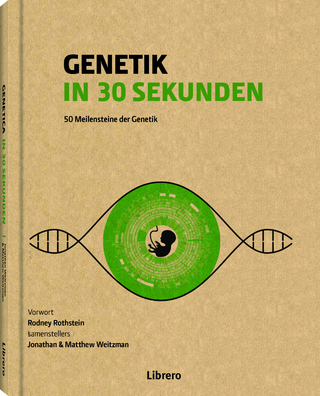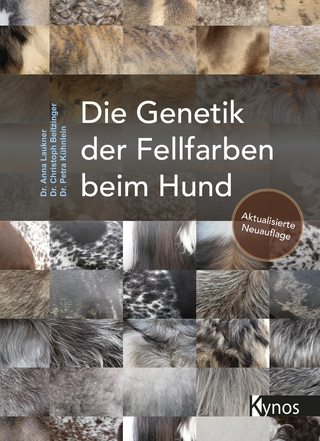
Cellular Senescence and Aging
Academic Press Inc (Verlag)
978-0-443-18896-1 (ISBN)
Additional sections cover Assessing microbiota composition in the context of aging, Assessing chronological aging in Saccharomyces cerevisiae, Image processing and supervised machine learning for retinal microglia characterization in senescence, Measuring telomerase activity using TRAP assays, High throughput assessment of cellular senescence, Detection of radiation-induced senescence by the Debacq-Chainiaux protocol: Improvements and upgrade in the detection of positive events, Dynamic and scalable assessment of the senescence-associated secretory phenotype (SASP), Flow cytometry-assisted quantification of cell cycle arrest in cancer cells treated with CDK4/6 inhibitors, and more.
Giulia Petroni is a PhD Fellow at the Department of Experimental and Clinical Medicine, University of Florence. Giulia does research in Oncology, focusing on the ion channels' role in Colorectal Cancer. She has also an expertise in Clinical Immunology and Immunogenicity. She has published over 15 articles in international peer-reviewed journals. Dr. Oliver Kepp graduated from Humboldt University Berlin and obtained a PhD degree in Molecular Biology. Today he is a tenured researcher at INSERM and a Co-director of the BioCell automation platform at GRCC. Oliver and his team investigate several aspects of tumor immunogenicity, focusing on systems cell biology approaches. He is also a co-founder of Samsara therapeutics and was appointed associate director of the European academy of tumor immunology in 2019. Oliver received the prestigious Clarivate Highly Cited Researcher Award four years in a row since 2018 and has recently been ranked among the top biology and biochemistry scientists in France (#5; www.research.com) Lorenzo Galluzzi is Assistant Professor of Cell Biology in Radiation Oncology at the Department of Radiation Oncology of the Weill Cornell Medical College, Honorary Assistant Professor Adjunct with the Department of Dermatology of the Yale School of Medicine, Honorary Associate Professor with the Faculty of Medicine of the University of Paris, and Faculty Member with the Graduate School of Biomedical Sciences and Biotechnology of the University of Ferrara, the Graduate School of Pharmacological Sciences of the University of Padova, and the Graduate School of Network Oncology and Precision Medicine of the University of Rome “La Sapienza. Moreover, he is Associate Director of the European Academy for Tumor Immunology and Founding Member of the European Research Institute for Integrated Cellular Pathology. Galluzzi is best known for major experimental and conceptual contributions to the fields of cell death, autophagy, tumor metabolism and tumor immunology. He has published over 450 articles in international peer-reviewed journals and is the Editor-in-Chief of four journals: OncoImmunology (which he co-founded in 2011), International Review of Cell and Molecular Biology, Methods in Cell biology, and Molecular and Cellular Oncology (which he co-founded in 2013). Additionally, he serves as Founding Editor for Microbial Cell and Cell Stress, and Associate Editor for Cell Death and Disease, Pharmacological Research and iScience.
1. Assessing polyglutamine tract aggregation in the nematode Caenorhabditis elegans
Aggeliki Sotiriou, Christina Ploumi, Nikolaos Charmpilas and Nektarios Tavernarakis
2. Generation of glial cell-derived neurotrophic factor (gdnf) morphants in zebrafish larvae by cerebroventricular microinjection of vivo morpholino
Suzita Mohd Noor, Chee Ern David Wong, Pooi-Fong Wong and Anwar Norazit
3. Methods for detection of mitochondrial reactive oxygen species in senescent cells
Fenniche Salma, Oubaddou Yassire, Bakri Youssef, Dupuy Corinne and Ameziane El Hassani Rabii
4. Assessment of cell cycle progression and mitotic slippage by videomicroscopy
Luca Mattiello, Sara Soliman Abdel Rehim, Gwenola Manic and Ilio Vitale
5. The original colorimetric method to detect cellular senescence
Manjari Dimri and Goberdhan P. Dimri
6. Assessing microbiota composition in the context of aging
Diana Campos-Iglesias, José M.P. Freije and Carlos López-Otín
7. Assessing chronological aging in Saccharomyces cerevisiae
Adina Schulze, Andreas Zimmermann, Katharina Kainz, Nadine B. Egger, Maria A. Bauer, Frank Madeo and Didac Carmona-Gutierrez
8. Image processing and supervised machine learning for retinal microglia characterization in senescence
Soyoung Choi, Daniel Hill, Jonathan Young and Maria Francesca Cordeiro
9. Measuring telomerase activity using TRAP assays
Gabriele Saretzki
10. High throughput assessment of cellular senescence
Giulia Cerrato, Allan Sauvat, Felix Peyre, Oliver Kepp and Guido Kroemer
11. Detection of radiation-induced senescence by the Debacq-Chainiaux protocol: Improvements and upgrade in the detection of positive events
V. Paget, O. Guipaud, A. François and F. Milliat
12. Dynamic and scalable assessment of the senescence-associated secretory phenotype (SASP)
Nicolas Malaquin and Francis Rodier
13. Flow cytometry-assisted quantification of cell cycle arrest in cancer cells treated with CDK4/6 inhibitors
Vanessa Klapp, Norma Bloy, Carlos Jiménez-Cortegana, Aitziber Buqué and Giulia Petroni
14. Mechanistic exploration of autophagy and aging by RNA interference
Hui Pan, Oliver Kepp and Guido Kroemer
| Erscheinungsdatum | 03.01.2024 |
|---|---|
| Reihe/Serie | Methods in Cell Biology |
| Verlagsort | San Diego |
| Sprache | englisch |
| Maße | 191 x 235 mm |
| Gewicht | 760 g |
| Themenwelt | Naturwissenschaften ► Biologie ► Genetik / Molekularbiologie |
| Naturwissenschaften ► Biologie ► Zellbiologie | |
| ISBN-10 | 0-443-18896-3 / 0443188963 |
| ISBN-13 | 978-0-443-18896-1 / 9780443188961 |
| Zustand | Neuware |
| Haben Sie eine Frage zum Produkt? |
aus dem Bereich


